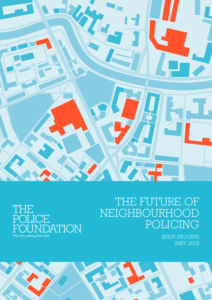View the report launch presentation
Click the bottom left hand corner to expand
About the project
Neighbourhood policing is widely regarded as the ‘bedrock’ of British policing. However, as forces have adapted their operating models to new funding and demand challenges, the form in which it is delivered has diversified, and in some places diminished.
Concerns have been raised that the ability of the police to prevent crime may be undermined if neighbourhood teams are eroded. ‘Hybrid’ roles (for example, combining neighbourhood functions with response or investigation work) have been introduced and some officers are no longer attached to specific localities. The meaning of neighbourhood policing is becoming more ambiguous and agreement on what it is and how it should function risks breaking down.
At the same time, many neighbourhoods are themselves changing, becoming more diverse and dissimilar. Arguably, their policing needs are becoming more difficult to identify and understand. The focus of policing has also changed, with new emphases on ‘hidden’ harm and vulnerability. These have been added to or superseded previous local policing objectives such as promoting public confidence, providing visible reassurance and tackling crime and antisocial behaviour in public spaces.
Project aims
The project examined the following:
- How neighbourhood policing has changed in England and Wales since the end of the Neighbourhood Policing Programme in 2008 – and what it looks like in 2017.
- What can be said about the impacts and consequences of the different approaches taken over the period.
- How forces allocate resources to neighbourhood policing, and how these in turn are allocated between neighbourhoods.
- How neighbourhood resources are deployed to specific policing activities and how different approaches and policing styles are tailored to particular neighbourhoods.
- How neighbourhood policing connects to, supports and is supported by other local services and other police functions – and how this might be improved.
- How changes in crime, technology, society and the public’s expectations have changed the policing needs of neighbourhoods, how neighbourhood policing has adapted so far, and how it might do so in the future.
